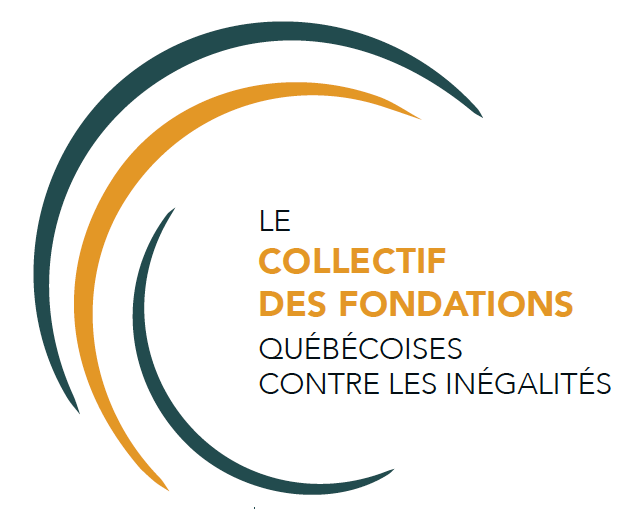
Le Collectif des fondations québécoises contre les inégalités (The Collective) is a network of foundations working to promote dialogue about the respective roles that government and philanthropy should play in reducing inequality. It brings together over a dozen public and private foundations of varying size, capacity and mission focus.
September 23rd 2020
In 2020, inequality and its effects can no longer be ignored. The pandemic has laid bare, exploited and exacerbated existing inequalities of health, income, wealth and social standing. These inequalities are not new, having been created and further entrenched by decades of fiscal reform and welfare state retrenchment.
It is true, as Adam Saifer points out in his blog, that the current context both reveals and reminds us of the limits of philanthropy in being able to combat these inequalities. The Collectif des fondations québécoises was already convinced of these limits well before the current crisis took hold. From its beginnings in 2014-15, the Collective has stood by its position that the state is and must remain the leading actor of any large-scale effort to reduce social and economic inequalities.
The combined health, social and economic crises that we are currently going through serve to demonstrate this point: our governments alone have the necessary powers, fiscal resources and capacities to intervene on a vast scale to protect the health of the entire population and to help citizens manage through periods of economic shut-down. Altogether, the wide range of public measures introduced since the spring have been enacted on a scale that can meaningfully move the needle on certain measures of inequality.
Whether in times of crisis or in “normal” times, philanthropic foundations have neither the mandate, capacities or resources that governments do to make the kinds of systemic shifts needed to combat widespread inequality. Rather, foundations play a role that is both singular and separate from that of governments at all levels. This said, we do believe that foundations can make their own distinct contributions to stemming the progression of inequality and its effects. Thanks in part to their independence, foundations can foster innovation and further social “R&D”, give attention to less visible causes and raise up the voices of marginalized groups. They can also take the long view, allowing for the sustained engagement needed to take on complex problems, as well as support the autonomy and organizing capacity that civil society needs to make its voice heard on numerous issues.
There appears to be a considerable social consensus in favour of maintaining a strong role for government during and after the COVID-19 crisis. Public opinion is in favour of more progressive tax measures to help pay for this role. The Collectif des fondations has previously stated its support for a progressive tax system as one of the most powerful means of redistribution available to governments.
Having made this statement, member foundations of the Collective recognized that we needed to turn the mirror inwards to reach some sort of understanding about how we should align our own goals, values and practices with this view. We are aware that philanthropy does not exist in isolation from the wider political and economic world. Along with Helmut Anheier, we recognize that:
As long as countries have levels of social inequality that much of the population regards as unjust, philanthropy will be easily challenged. A fair tax system is in many ways the sine qua non for a socially and politically sustainable system of modern philanthropy.
Foundations themselves benefit from a favourable fiscal treatment. Their income and assets are both tax exempt, and the creation of endowments is supported by one of the most generous tax incentive systems in the world for charitable donations . Overall, Canada’s system of fiscal incentives and benefits in support of charities reflects a shared interest and desire to recognize, encourage and promote private contributions to the public good. Still, the question remains: how do we as Collective members reconcile these tax benefits that enable the creation and ongoing existence of foundations with our stated wish that governments put taxation to work to reduce inequality?
First off, it is important to recognize that these tax benefits represent an indirect public subsidy to foundations. This makes their activities a matter of legitimate public interest, and foundations should seek to demonstrate how they are contributing to the public good. This implies being accountable for their actions, both to the public and towards the communities that are served or affected by their action. This sense of accountability should also push foundations to commit in an ongoing way to improving their impact and collaborations with other important stakeholders.
Along with just about every other foundation in the country, members of the Collective have been highly attuned to the urgent needs that have surfaced during the current crisis and have stepped up their efforts to respond to them. Among other actions taken, the largest endowed foundations in our ranks have committed to increase their payout rates over the next several years.
Increasing foundation payout, whether voluntarily or mandated by changes to the disbursement quota, does not by itself guarantee that this money will go towards combatting inequality and its effects. As foundations for whom this is important, members of the Collective have identified a few commitments that we believe can help us to increase the effectiveness and coherence of our action in this area.
To begin, we have to recognize and try to reduce our own “inequality footprint” as foundations. Foundations’ independence and financial means translate into power and influence, power that is often concentrated in the hands of a small number of donors in the case of private foundations. The effects of this power and influence can make themselves felt within the communities they serve, within partnerships, and even across entire fields of action.
To reduce this aspect of their “inequality footprint”, member foundations of the Collective are pushing themselves and each other to embrace practices that move in the direction of redistributing power and using it to build up the power of communities that are struggling for equity and justice. This can include democratizing foundation policies and governance practices to bring in community voice, input and oversight on the decisions that affect them. This can also include directing foundation support to help build up the power of communities to influence and take part in the broader policy decisions that affect them.
The issue of the inequality footprint of foundations is also bound up with how they manage their endowed assets. Members of the Collective are challenging themselves and each other to strive for a “zero inequality” footprint in this area, by directing their investment decisions towards corporate actors and sectors of activity that actively seek to mitigate or reduce inequalities.
We hope that other foundations will join us in embracing practices that aim to reduce their inequality footprint. If together we are able to show how we are aligning all of our actions to combat inequality, we can feel solid about the foundation community’s positive contribution with respect to one of the great challenges of our time.
This blog post is in response to an article by Adam Saifer that was published by The Conversation Canada: COVID-19 has exposed the limits of philanthropy


